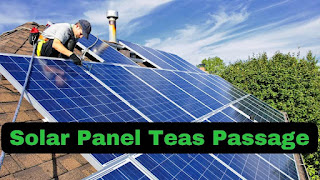Best Solar Panels Teas Passage of 2023

Introduction: Embracing Solar Energy
In an era where Solar Panels Teas Passage environmental concerns are paramount, the quest for sustainable energy sources has never been more critical. Solar panels have emerged as a shining star in this quest, promising clean, renewable, and abundant energy. This article dives deep into the world of solar panels, exploring their types, working principles, applications, and environmental impact.
Table of Contents
The Basics of Solar Panels Teas Passage
Solar Panels teas passage: are composed of multiple solar cells, typically made from silicon, which can generate a direct current (DC) when exposed to sunlight.
Solar Panel Types: Monocrystalline, Polycrystalline, and Thin-Film
Solar Panels teas passage: Polycrystalline panels are cost-effective and widely used. Thin-film panels are lightweight and flexible, making them suitable for unique applications.
How Do Solar Panels Work?
Solar panels operate on the principle of the photovoltaic effect. When sunlight strikes the solar cells, it excites electrons, creating an electric current. This current is then converted into alternating current (AC) through an inverter for use in homes and businesses.
Solar Panels for Residential Use
Solar Panels teas passage are gaining popularity as homeowners seek to reduce energy bills and their carbon footprint. Installing solar panels on rooftops allows homeowners to generate their electricity, leading to long-term savings.
Solar Panels for Commercial and Industrial Applications
Beyond residential use, solar panels are extensively employed in commercial and industrial sectors. Large-scale solar installations provide businesses with substantial cost savings and demonstrate their commitment to sustainability.
The Environmental Impact of Solar Panels
Solar Panels teas passage: significantly reduce greenhouse gas emissions compared to traditional fossil fuel-based energy sources. By harnessing sunlight, they help combat climate change and contribute to cleaner air and water.
Solar Panels and Energy Efficiency
Improvements in solar panel efficiency are ongoing, making them even more attractive. Higher efficiency panels generate more electricity from the same amount of sunlight, increasing the return on investment.
Government Incentives and Rebates
Solar Panels teas passage: Many governments offer incentives and rebates to encourage solar panel adoption. These incentives can offset the initial installation cost and accelerate the payback period.
Solar Panel Installation: What to Expect
Installing Solar Panels teas passage: involves several steps, including site assessment, permitting, and mounting. Homeowners and businesses should work closely with professionals to ensure a smooth installation process.
Solar Panel Maintenance: Keeping the Shine Alive
Proper maintenance is crucial to ensure the longevity and efficiency of solar panels. Regular cleaning and inspection can prevent issues and maximize energy production.
The Future of Solar Technology
The future of solar technology is promising, with advancements in energy storage, efficiency, and integration with smart grids. Solar energy is poised to play a pivotal role in the world’s transition to a sustainable future.
Common Myths and Misconceptions
Dispelling myths and misconceptions about solar panels is essential for informed decision-making. We address common concerns and clarify the benefits of solar energy.
Conclusion: A Bright Future with Solar Energy
In conclusion, the Solar Panels teas passage: a beacon of hope in our pursuit of clean and sustainable energy. Their widespread adoption can help combat climate change, reduce energy costs, and create a brighter future for generations to come.
FAQs: Your Solar Panel Questions Answered
1. Are solar panels cost-effective for residential use?
Yes, solar panels can lead to significant cost savings over time, making them a wise investment for homeowners.
2. How long do solar panels last?
Most solar panels have a lifespan of 25 to 30 years, with warranties often covering this period.
3. Do solar panels work in cloudy or rainy conditions?
Many governments offer tax credits, rebates, and incentives to promote solar panel installation.
4. Can solar panels be installed on any type of roof?
Solar panels can be installed on most types of roofs, but a professional assessment is needed to ensure suitability.
This article has shed light on the remarkable world of solar panels, highlighting their benefits, applications, and potential for a sustainable future. Embrace the power of solar energy and take a step towards a greener tomorrow.
One Comment